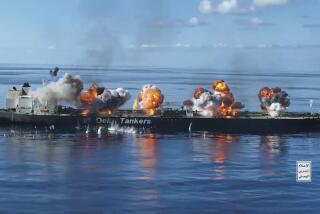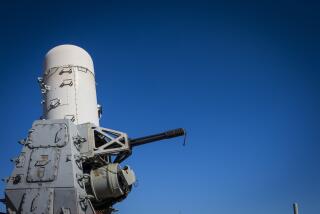Daylong Fighting Leaves 25 Iraqis Dead, U.S. Says
BAGHDAD — A day of fighting between U.S. troops and insurgents in the turbulent city of Ramadi left 25 Iraqis dead and 17 wounded, the military said Thursday.
A fresh wave of fighting erupted Wednesday afternoon in the predominantly Sunni Muslim city about 60 miles west of Baghdad after a homemade bomb exploded alongside a Marine convoy. Guerrillas then attacked with small-arms fire and rocket-propelled grenades, starting a series of clashes that ground on throughout the day. U.S. troops backed by warplanes battled dozens of insurgents.
Helicopters thumped overhead Thursday, searching the city, and the military announced that more than 25 suspected guerrillas had been arrested.
By nightfall, Ramadi had grown calm; U.S. troops, tanks and transport vehicles ringed the city, concentrating on the eastern and western roads into town.
One soldier and 13 Marines were injured in the fighting, but none of their wounds were life-threatening.
Meanwhile, a decapitated corpse turned up along the Tigris River in the northern town of Baiji. A severed head was discovered nearby. Bulgarian officials were trying to determine whether the remains were those of 32-year-old Ivailo Kepov, a truck driver missing since late June.
This was the second headless corpse to turn up along the same stretch of the Tigris. A body found July 14 has been identified as that of another Bulgarian truck driver, Georgi Lazov, 30, who went missing near Mosul along with Kepov. After their disappearance, the Arabic-language Al Jazeera satellite TV channel showed a video in which Lazov was kneeling in front of masked guerrillas.
The hostage-taking drama intensified Thursday, as the number of truck drivers known to be held by a group calling itself the “Holders of the Black Banners” grew to seven.
On Wednesday, militants released a videotape showing six men and threatened to behead one of them every 72 hours, beginning Saturday night.
A video released Thursday, however, showed three Kenyans, three Indians and an Egyptian.
The men, who work for a Kuwaiti company, were shown pleading for their lives. The Egyptian hostage tried to comfort his mother and children, insisting that Iraqis are “the best people” and promising to come home again.
“But if we die,” he said, “then I say thank God.”
Their captors have demanded that India, Kenya and Egypt pull all their citizens from the country, and the Kenyan government urged its citizens to leave Iraq immediately.
None of the three nations has sent soldiers to Iraq, but all are poor countries whose people are often forced to look for work overseas.
Many of their citizens are willing to accept the dangers of Iraq in exchange for a steady paycheck.
“If they carry out their threat it would be a serious development. We condemn this incident,” Indian Foreign Minister Natwar Singh said.
Violence flared throughout the day. A young boy was scavenging for cans near a mosque in the Adhamiya neighborhood of Baghdad when a homemade bomb exploded, killing him.
“I can say he is gone with the wind,” said Mohammed Hussein Abbass, 35, who was headed into a nearby restaurant for lunch when the explosion shook the street. “I do not know why they put such a bomb in this area. It is a stupid work.”
A second bomb went off on a crowded corner in southern Baghdad, killing two children and wounding two people, witnesses said.
Staff at a nearby hospital said a woman died of wounds suffered in the blast.
More to Read
Sign up for Essential California
The most important California stories and recommendations in your inbox every morning.
You may occasionally receive promotional content from the Los Angeles Times.









